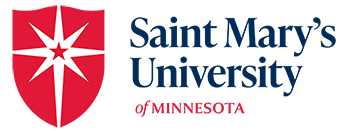Kim Schroeder admits she was nervous about going back to school to complete her bachelor’s degree.
“I hadn’t taken a class for 20 years, and I had never done an online class, so I was really nervous about that,” she said. “I’m learning the content but also how to learn again, how to do school again, how to upload a Google doc, so there was a learning curve, but it came so quickly. There were so many resources available. You guys give us access to everything we need.
“I quickly learned it was going to be doable,” she added. “Every instructor has been just easy to work with, very helpful and understanding.”
She chose Saint Mary’s because the curriculum and process seemed the most streamlined, the website was easy to understand, and faculty and staff were responsive.
Schroeder chose the B.S. in Applied Psychology program because she has an interest in eventually getting her master’s degree and creating a support or recovery coaching support program for those with addictions and their families.
“My husband is in recovery and I’m walking alongside him,” she said. “In the last 3½ years, I have learned so much about mental health and learned and healed from the family I grew up in,” she said. “This whole new world was opened up as I’ve learned about the disease of addiction which fascinates me.”
Schroeder said she had gotten a mental health coach certification and took a short course through Stanford and was thinking about the next step. Then, she said her husband asked her what she would do if obligations and money were not an obstacle.
She responded, “I would get my degree.” And he said, “You just need to do it then.”
Finishing her bachelor’s degree was something Schroeder had considered for a while but with three adolescent boys — active in sports and extracurriculars — timing hadn’t felt right. But she knew having a bachelor’s degree opens the doors to more employment options. “Even before I became interested in addiction, when I worked in the medical field, I would look at supervisor positions, but think, ‘Oh, but I don’t have a bachelor’s degree.’ ”
She found the online courses made it more doable. While most adult students talk about going night school, Schroeder said that wouldn’t have worked for her. “I have time during the day, because my kids are at school most of the time, and that’s when my window is,” she said. “And to not have to log into a Zoom at a certain time, to be able to do it on my own schedule worked well.”
Schroeder was surprised that even with online courses that she has gotten to know several other adult learners. “I feel more connected than I would have imagined,” she said, adding that she and other students sometimes text each other or connect online.
She also didn’t know if she would be learning alongside all 20-year-olds, fresh from high school. “There are some younger than I am, but also some older than I am. I am among similar peers,” she said.
Another pleasant surprise has been the ability to direct her coursework to her specific area of interest. “I was surprised at how much freedom I would have to be able to take what we were learning but then do my own research on the topics that interested me,” she said. “ I’ve been able to dive into this field of addiction. It was tied to my interests and what I’m passionate about.”
As she completes the program this spring, Schroeder has this advice for new or incoming adult learners. “You have to be able to see a window of time in your week or each day to set aside,” she said. “I’ve done two courses at a time, and I haven’t been able to procrastinate. I think you could fall behind if you’re not doing a little something each day to keep on track. With that said, the instructors have been so understanding. I lost my mom in November, but I’ve been able to stay on course. I wanted to stay on track to graduate, and I talked to my professors, and they were understanding about letting me be a little bit late that week on some assignments.”
Schroeder said she may not go directly into her master’s degree immediately, and she isn’t like many students looking to go job seeking with her newfound degree, but she won’t lose sight of her goal. Regardless, she said, she is applying what she has learned to her everyday life.
“This program has gone great; I’m so glad I did it,” she said. “If I go onto master’s or even if I never do, I feel like the program has changed the way I think and shaped me and opened up my eyes to applied psychology — all the influences that go into making us who we are and why we think and do the things we do. It’s changed what I bring into this house and into conversations with my husband and kids. I’m grateful for that.”

